Bravo to the DoraHacks team for organizing the two rounds of community grant.
Community grant is an important component of the Dora Factory development. Building infrastructures for DAOs is a long-term effort and requires community participation. In contrast to a template-based DAO launching system, Dora Factory is an open infrastructure consisting of tools that are useful to empower DAOs of any form. Therefore, a sustainable funding mechanism to allow the Dora community to continuously support ideas / projects and eventually automate the mechanism via HackerLink is an important task.
There are two types of projects that the Dora Factory community grant rounds are designed to support:
- DAOs that shift paradigm of existing organizations
- Infrastructures that empower DAOs and open source communities
Because the Dora Factory infrastructure is modular, there is a lot of interesting technology to experiment with. The community grant itself is a form of decentralized governance, therefore, the community grant rounds are also playgrounds of Dora technologies and products.
Another interesting fact is that the Dora Factory infrastructure is built in a multi-chain environment, so technically, a community grant can be hosted on any chain that is compatible with the Dora QF contract (or QF pallet). In theory, the community grant can be hosted on different chains, and that’s what has been done in practice as well (more details later).
An Attempt of Cross-chain Governance
The first Dora Factory community QF round is on the Ethereum mainnet, using DoraHacks’ standard quadratic funding smart contract. The round was created during a time when the Ethereum gas fee was relatively low. However, when the community started to vote for the projects, they realized that the gas fee was too high and sometimes exceeded the total amount of their intended contribution. Therefore, the participation in QF round-1 was largely suppressed.
In the second round, the grant team decided to run the program on a Substrate network, based on a QF pallet that was developed under the Web3 Foundation Open Grant Program in February 2021, as the first functioning QF modules on Substrate. A Substrate testnet (Dora Factory Testnet[0]) was launched for the purpose of the round-2, and the QF pallet was instantiated on the testnet.
The task here is to effectively distribute the testnet tokens to the DORA community based on measurable rules. To prove community identity, a user from the DORA community stakes some amount of DORA into DoraID (a staking-based decentralized DID framework). In the meantime, an operator collects Substrate addresses from each user who staked via DoraID, and airdrops an equal amount of DORATEST[0] to that user on the Substrate testnet. A user who receives the testnet token can then use those tokens to vote for projects they want to support. The round closes with matching funds distributed based on the quadratic funding formula.
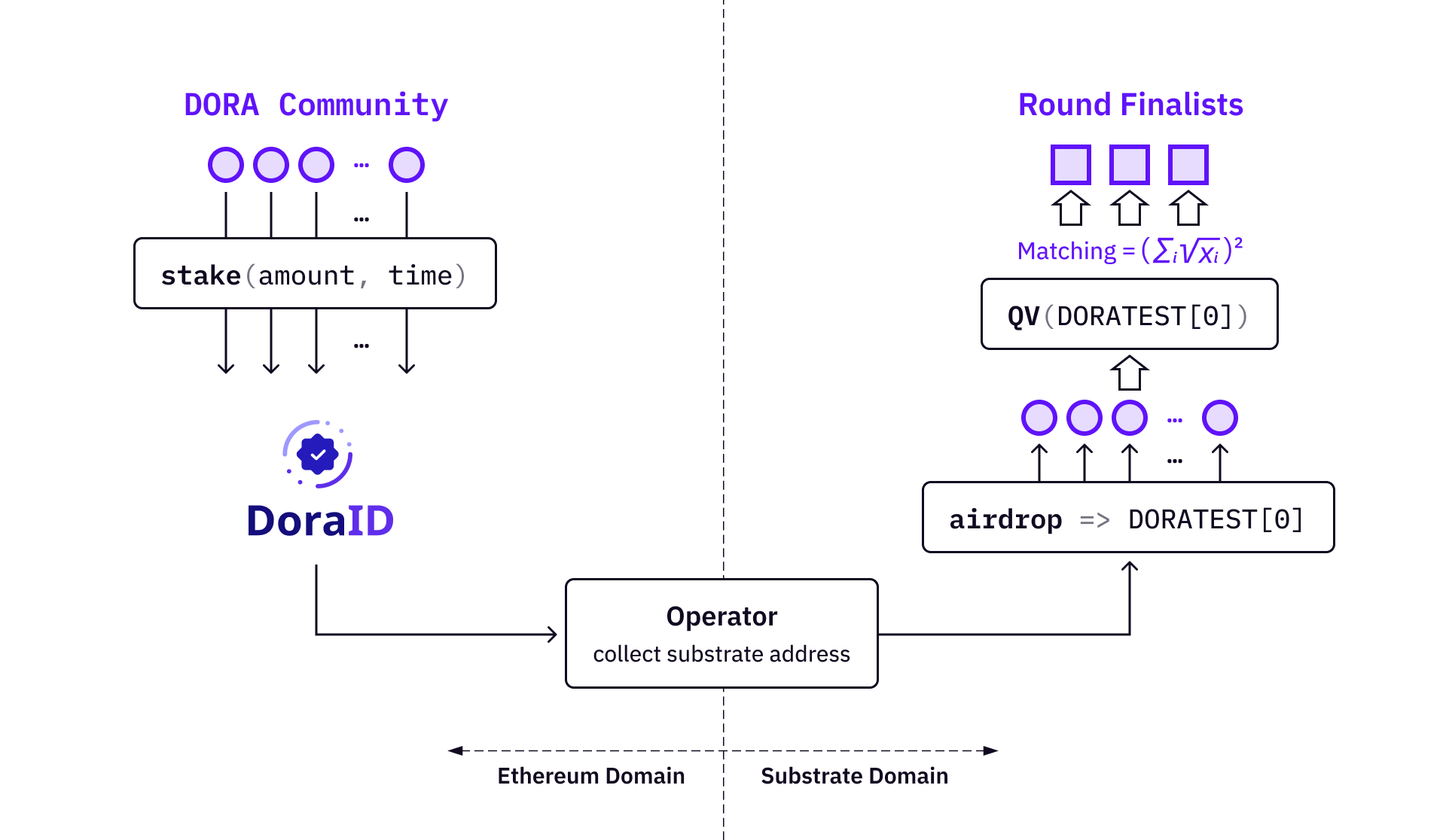
Since both DoraID and the Substrate network transactions are transparent, the integrity of the process is guaranteed because anyone can verify the transaction history on-chain.
Note: in this round, the integrity of the Substrate network actually depends on the honesty of the Substrate POA node. In the worst case, if the POA node creates artificial vote history, the community can collectively check the correctness of the final result against the pallet’s output. In the future, the problem can be mitigated by involving more block validators, or further improved by decentralizing block validation.
Results
From the round-1, there were 8 projects (i.e. BUIDLs) submitted. 7 of 8 projects were DAOs (except Ethsign, a decentralized e-signing tool).
In the second round, we started to see more DAO infrastructures and DAO tooling projects. The Substrate multisig project is creating an open source frontend product for the Substrate multisig pallet developed by Parity, which is an important infrastructure for DAO treasury management in the Substrate ecosystem. The Dora Factory Moloch Fund is creating a community-driven venture capital to fund Dora Factory related projects with DORA. Full leaderboards of both rounds can be found on HackerLink [round-1, round-2] or see the screenshots below.
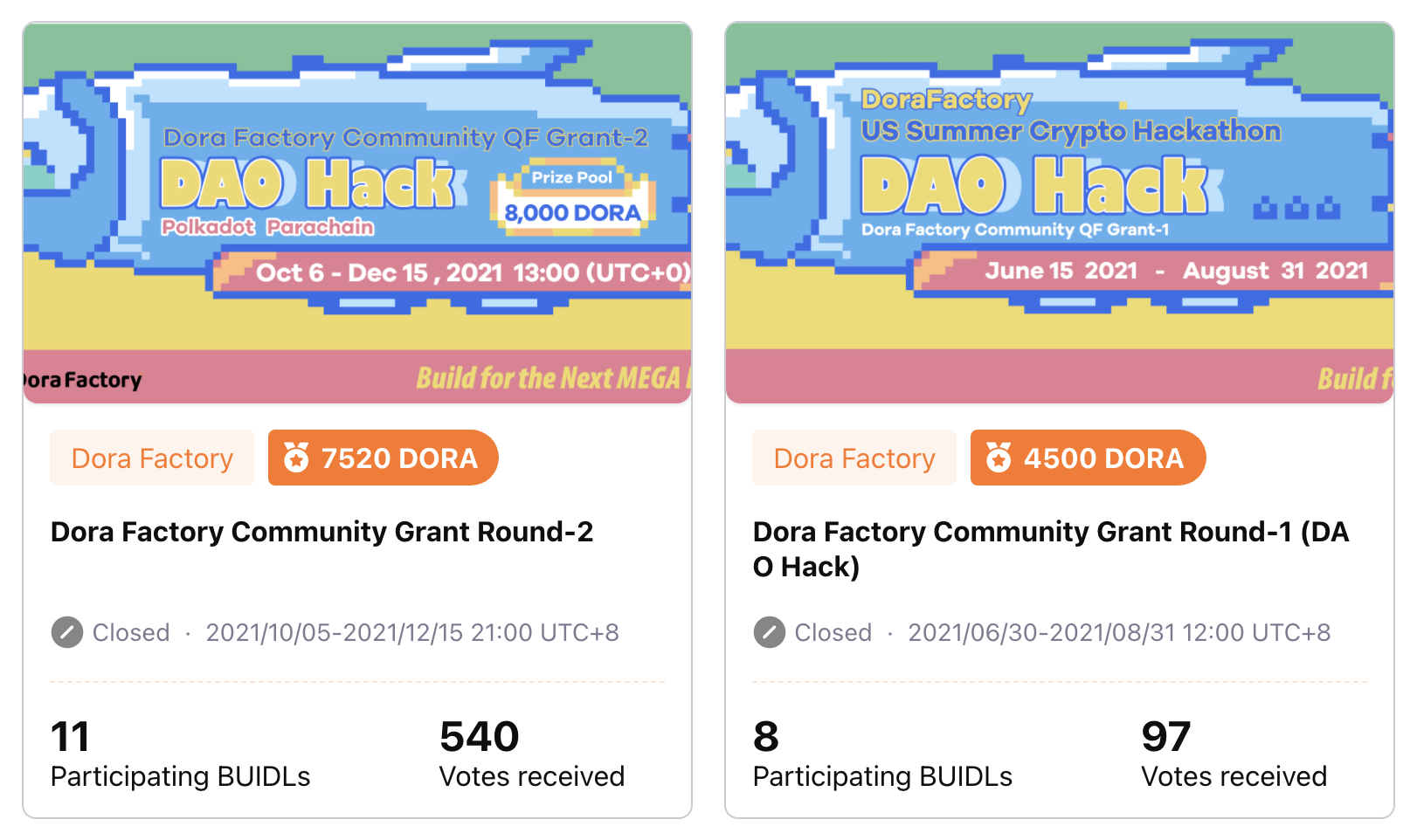
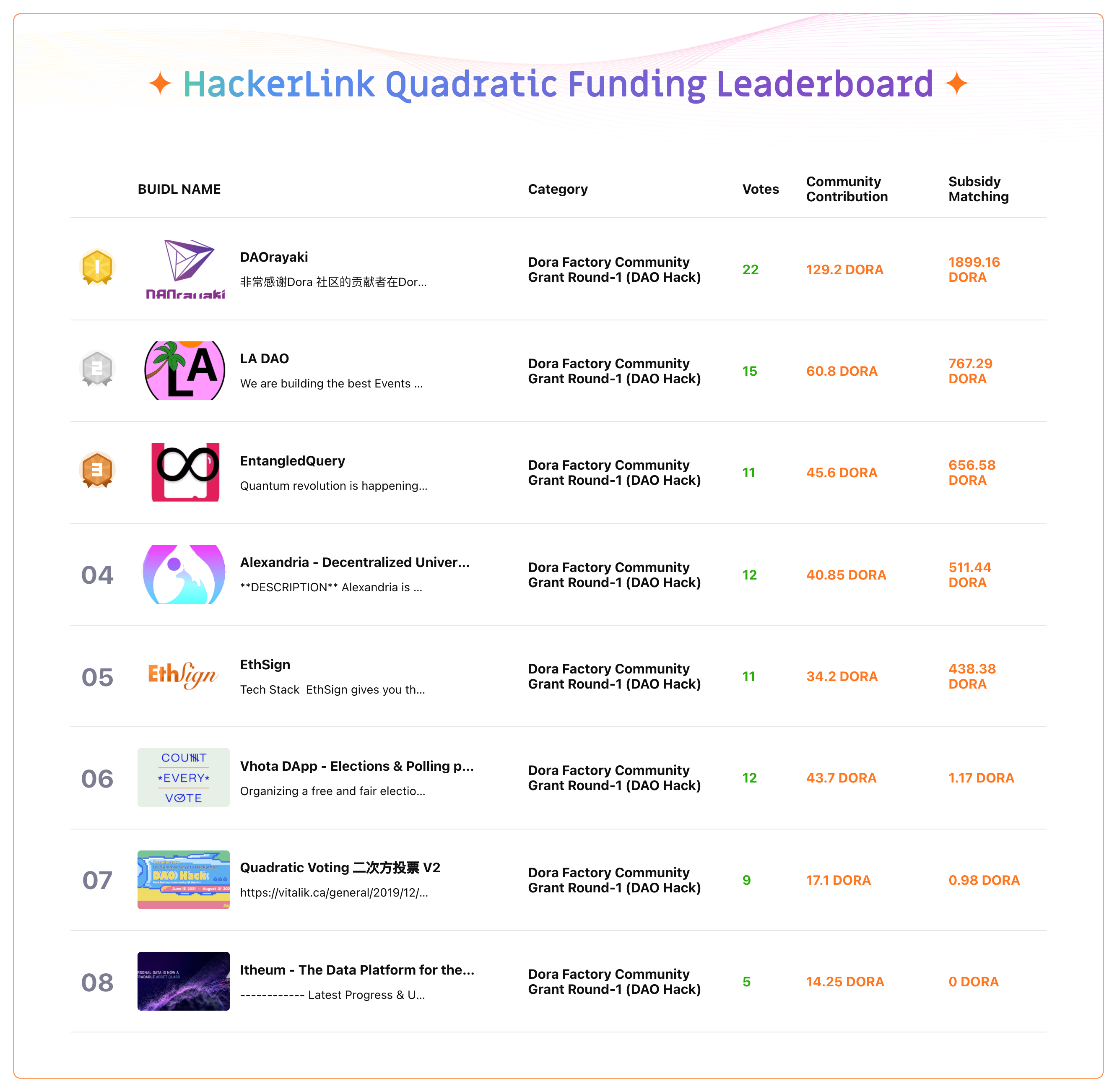
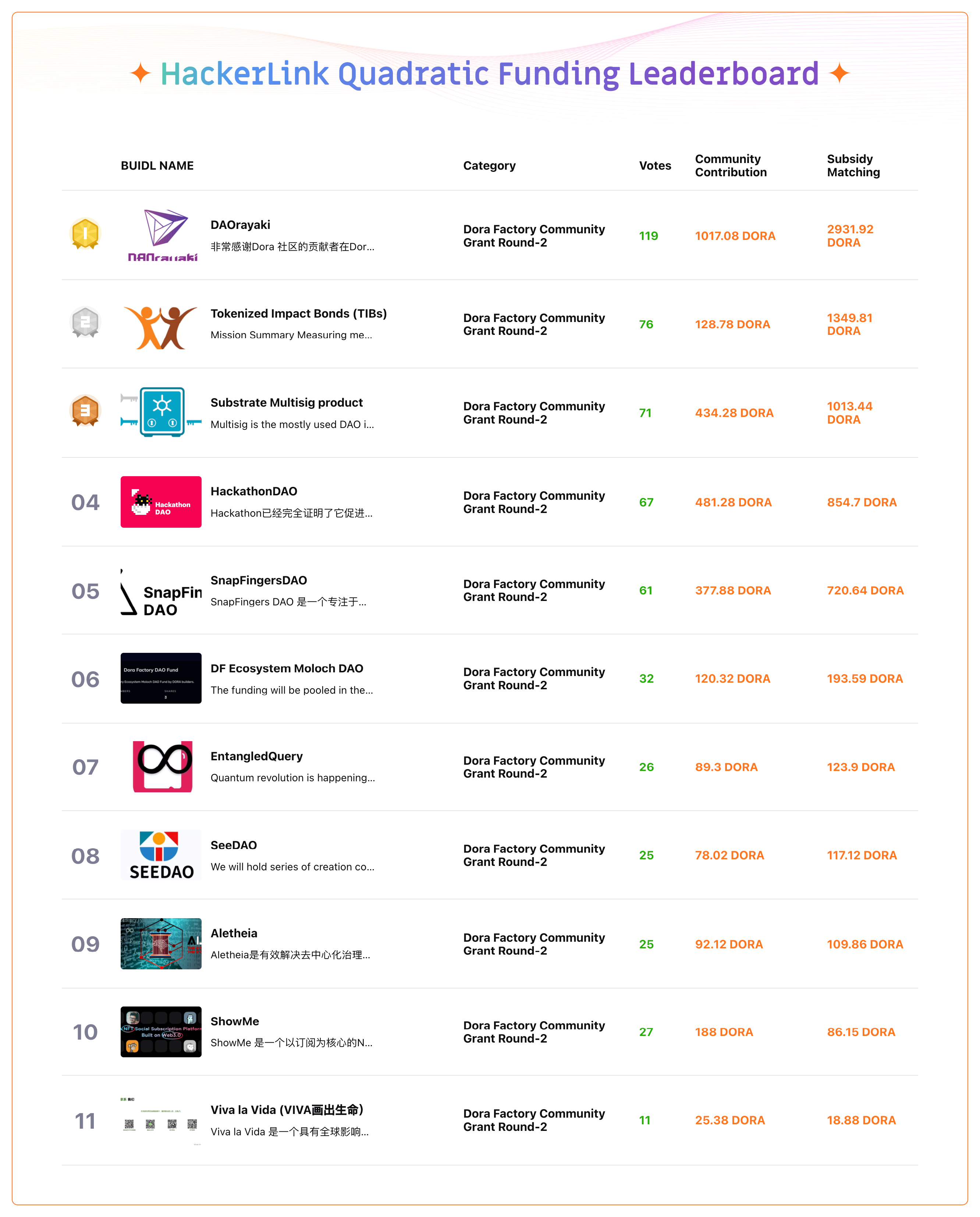
Most of the projects from the leaderboard continued their development after the rounds.
DAOrayaki, a decentralized media that transforms media funding mechanisms from corporate funding to community-driven funding, won the most matching funds in both rounds. This is not a surprising result because 1) DAOs have more community exposure than DAO tools in the early stage, 2) DAOrayaki has a vibrant contributor / reader community among all DAO projects.
As one of the very first projects supported by Dora Factory, DAOrayaki uses Dora technologies to grow and fund their communities (e.g. DAO bounties), and it is increasingly involved in the Dora Factory research efforts. Recently, the project launched a test Futarchy governance system, and received support from Hashkey and Gitcoin grants.
EntangledQuery is an open source quantum computing Q/A community that has not received any VC funding. The matching fund from the two rounds (especially the first round) helped them build up an MVP.
The list goes on. A comparison of the two funding rounds can be found below.
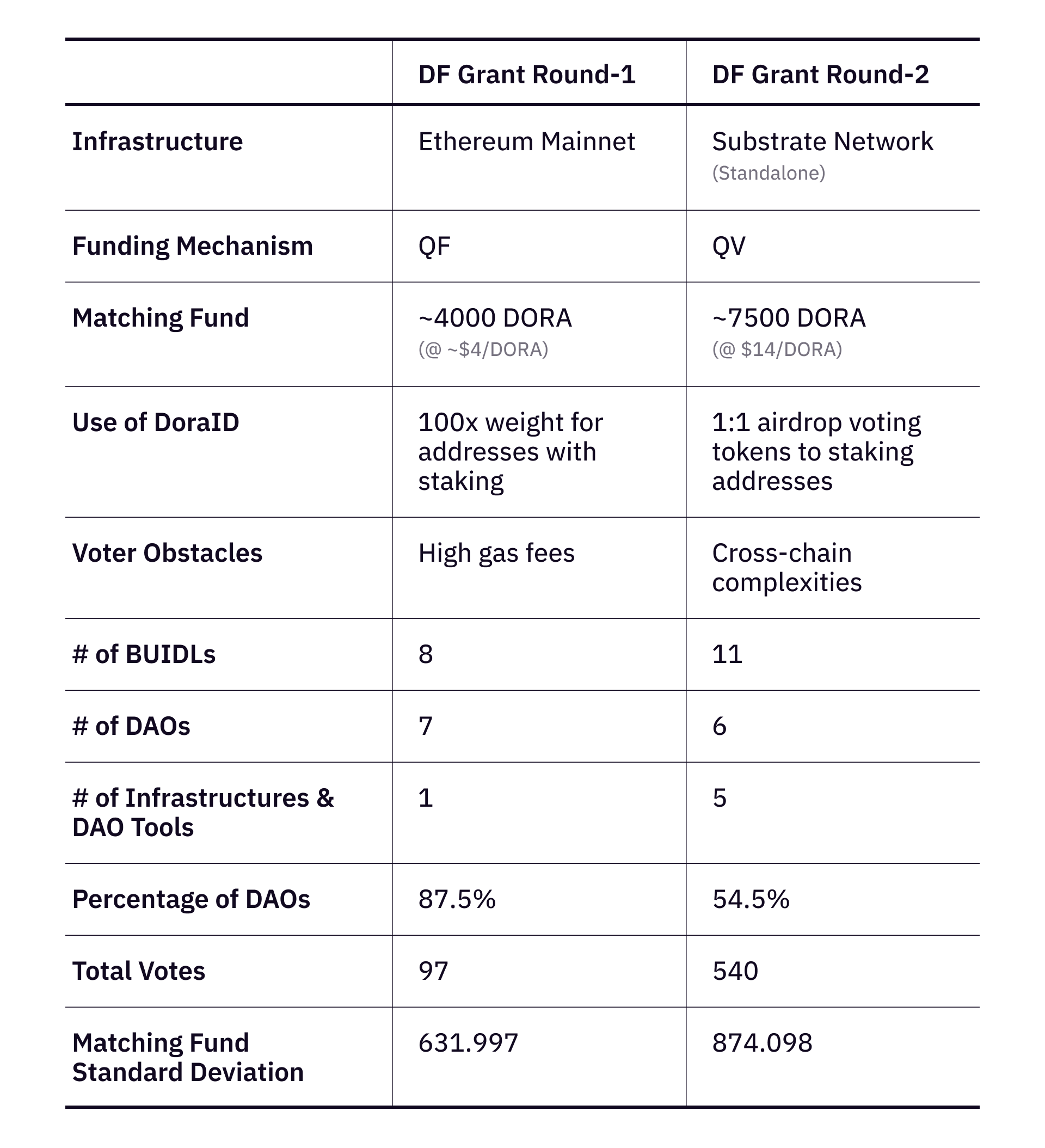
There was a distraction at the end of the second round. A bug was found during the late stage of the round-2 which resulted invalid votes being counted. Fortunately, voting history was recovered by a thorough analysis of on-chain data. After the data was successfully recovered, invalid votes were removed, and the results were updated. A report of the bug and its fix can be found here.
Future Rounds
Although being a young community, the first two rounds of Dora Factory community grant have effectively engaged the community to support ecosystem projects. There is a large space of growth potential in terms of community participation. The DORA community consists of people who have diverse backgrounds – DAO fans, open source developers, Web3 entrepreneurs, crypto enthusiasts, and institutional investors from all over the globe. We anticipate a wider participation of community contribution, voting, and feedback in the future rounds.
Besides the goal of funding more developers and DAO projects that are important to the DORA ecosystem as a whole, the community grant rounds are also playgrounds for community governance and community funding. As the Dora Factory and DoraHacks teams are developing technologies that improve DAO governance and community grants, we can expect an adoption of innovative funding mechanisms and advanced governance technologies in the future rounds.